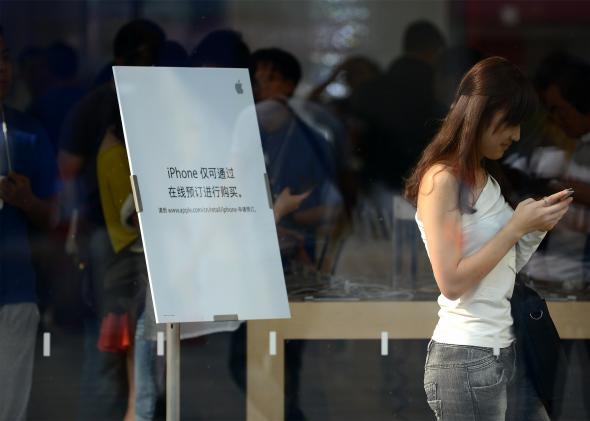Pity the aging worker in Silicon Valley. She has to worry not only about not being hired in favor of less experienced and cheaper colleagues barely out of teendom, but also, some are warning, the rise of “techneck.”
While the experts regularly chastise us about the ill effects of our technology-imposed sedentary lifestyles and bad posture, CACI international, a U.K. manufacturer and supplier of nonsurgical facelift systems, also wants to inform you that all those hours spent looking down at your Instagram feed are causing extra neck wrinkles.
Dean Nathanson, managing director of CACI international, felt compelled to go public with this information after the company noticed a surge in inquiries about their product’s effectiveness on lines around the neck area. The American Society of Plastic Surgeons also documented a 6 percent increase in neck lifts last year from 2012.
And of course it’s not just in Silicon Valley that smartphones have caused heads to tilt decidedly downward. So if you spend your days rotating from smartphone, to tablet, to laptop, should you be worried? (After all, if the Daily Mail says it’s so …)
I asked R. Laurence Berkowitz, a plastic surgeon whose practice is in San Jose, a place that must be riddled with wrinkly-necked techies. But he bluntly suggested that “techneck” is a fallacy.
“I’ve been in practice for 34 years and I’ve seen a lot of people who have spent their lives looking over everything from typewriters to keyboards. … I see more people that work for Google or Apple than anyone else, and I’ve never heard about it,” he assured me.
It’s all about sun exposure, genetic predisposition, and sometimes, weight loss, Dr. Berkowitz says. Either you have good skin elasticity as you age or you don’t.
But lest you think Silicon Valley denizens are in a post-physical world where coding ability is all that matters, Berkowitz told me that many of his patients are scheduling fillers and Botox like dentist appointments. The technology world’s well-documented veneration of youth is driving people to the surgeon for neck lifts and face lifts to keep their foreheads tight and ahead of the competition.
“I get a lot of: I need to look younger to compete with the young guns nipping at my heels at Apple,” Berkowitz told me.
And who can blame them? The legends tell of young entrepreneurs striking gold while barely out of braces and Proactiv. The Valley’s technocrats are also unabashed in their preference for young blood that can be trained in the latest skills and will accept minimum wage in return for equity ownership. Too many of the visible signs of aging and too much experience could count against you in a job interview.
Even Mark Zuckerberg told a Y Combinator Startup event at Stanford University in 2007, as reported by the San Francisco Chronicle: “I want to stress the importance of being young and technical. … Young people are just smarter. Why are most chess masters under 30? I don’t know. Young people just have simpler lives. We may not own a car. We may not have family. Simplicity in life allows you to focus on what’s important.”
The young may have smooth faces and uncluttered lives, but there’s no start-up yet that has been able to reverse the aging process and perhaps help you keep your engineering job for longer (although they’re working on it). Someday, Zuckerberg will get his neck wrinkles, too. As the Nora Ephron dictum goes: “Our faces are lies and our necks are the truth. You have to cut open a redwood tree to see how old it is, but you wouldn’t if it had a neck.”
